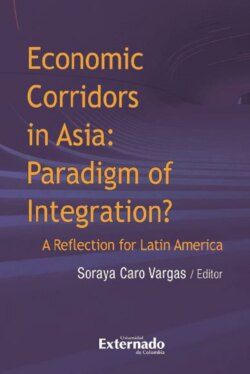Читать книгу Economic corridors in Asia : paradigm of integration? A reflection for Latin America - Varios autores - Страница 8
На сайте Литреса книга снята с продажи.
1. THE HISTORY OF A MULTICULTURAL ACADEMIC ENDEAVOUR
ОглавлениеFor a decade now, the Rectorate of the Externado University of Colombia and the School of Finance, Government and International Relations (FIGRI), have given a fillip to the promotion and strengthening of ties between their students and teachers and the countries of Asia and Africa. Some expressions of this commitment are: the creation of the Centre of Contemporary Studies on India and South Asia (Cesicam) in 2013, groups of scholars engaged in the systematic study of countries like China and Japan and the recent establishment of the Centre of Turkish and Caucasian Studies, with the support of internationally recognized partners such as business experts, academics and diplomatic missions.
In order to forge links with networks of specialists, during 2017 and 2018, CESICAM approached universities and think tanks in Eurasia, such as the Technical University of the Middle East METU in Ankara, the Islamabad Institute of Strategic Studies, (ISSI) in Pakistan or Jindal Global University in India, which have all been active participants in the connectivity debates and on the implications of the China Belt and Road Initiative (BRI). CESICAM scholars also attended international conferences which engaged with trends in connectographic studies like the one organized by the Leuven Center for Global Studies in August 2018, The Belt and Road Initiative and Global Governance (BRIGG).
Since there was a paucity of comprehensive academic analyses on the evolution of the BRI project in Colombia, researchers from the Centre of Specialized Studies (CIPE) and CESICAM, located in Ankara, Bogota and Johannesburg, decided to design an interdisciplinary research project in March 2018, in which scholars from different areas would present their findings on the state of the art of BRI in their lands, as well on the existence of other transregional routes and modes of integration, in such a way that, those visions became a reference point to Latin American governments, that were already invited by President Xi Jinping to be part of the BRI. Researchers from Turkey, Kazakhstan, Pakistan, India, Paraguay, Argentina, Colombia, Brazil and Mexico participated in the initiative. This publication is an academic journey through a multicultural and multidisciplinary corridor; an experience of collaborative work and thematic construction by a non-formal group of researchers from different latitudes, who share their concern about the profound changes that the accelerated physical and technological connectivity in the world will signify for the study and exercise of international relations in the near future, and in the definition of the foreign policy of States.
